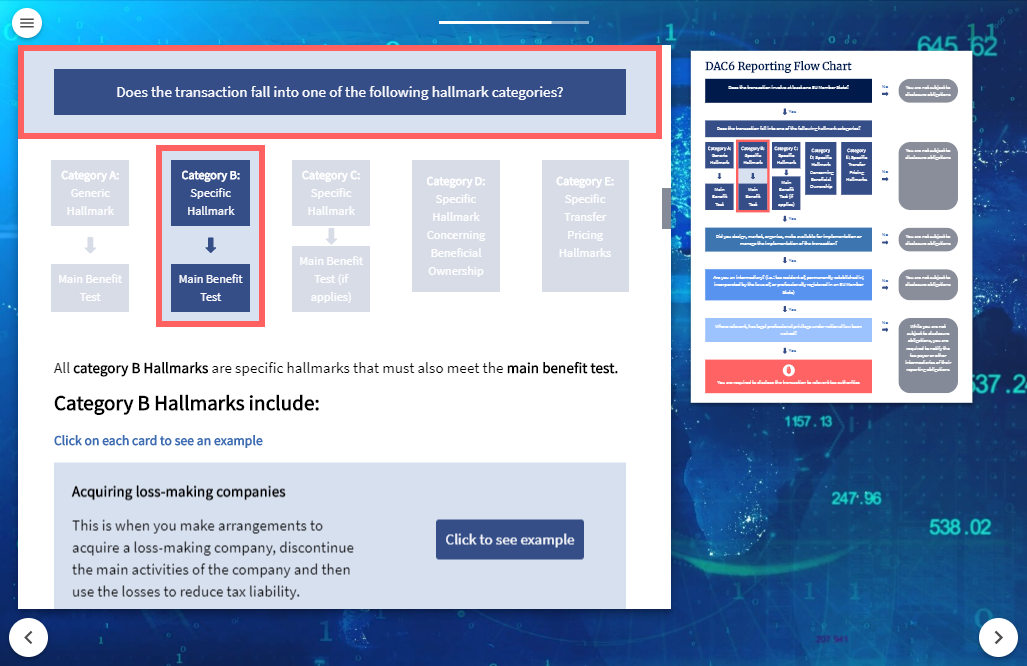Register for our DAC6 email updates

VinciWorks’ Legal and Research Executive
VinciWorks hosted a round table meeting at the office of Paul Hastings Solicitors with representatives from over 25 firms to discuss DAC6 and its implementation following HMRC’s Consultation Document and Draft Legislation. Ahead of the meeting, I was in touch with HMRC to ask them some questions relating to the proposed DAC6 legislation.
Here is an overview of the discussion:
Main Benefit Test
Are UK law firms expected to have in depth knowledge of how other member states will interpret the Main Benefit Test?
The consultation is clear that HMRC views the “main benefit test” as an objective test: what matters is whether a tax advantage is the main or one of the main benefits that the person entering into the arrangement might reasonably be expected to obtain from the arrangement. That person’s actual motivation in entering into the arrangement is not relevant.
HMRC consider that it is necessary to look at the tax effect of the arrangement as a whole, but they recognise there are challenges to this and are considering how this will work in different examples.
Potential challenges will arise here when there are multiple EU Member States involved, and they each have a different interpretation of the main benefit test. A firm will need to decide whose interpretation they should rely on.
Intermediaries
How is HMRC planning to differentiate between being a “promoter” and a “service provider” in practice?
A “promoter” is defined by HMRC as the intermediary who actually designs, markets, organises or makes available or implements a reportable arrangement. This is similar to the DOTAS concept.
A “Service Provider”, on the other hand, is the intermediary who merely provides assistance or advice in relation to the arrangement.
When asked about the differentiation between the two, HMRC said that this will often depend on the facts and circumstances. It may not be possible to draw a clear line. However, they did say that they will look to include examples in future guidance.
Can an Intermediary be both a “promoter” and a “service provider”?
HMRC are still considering how this would work if an intermediary was doing activities in both categories.
Is there an acceptable threshold below which it would be reasonable for a “service provider” not to review a matter to assess whether it requires reporting (e.g. less than x hours working on a matter)?
HMRC said: No, if a person provides any advice on an arrangement, and knows that it is reportable, it should be reported regardless of the number of hours worked on it. So the minimum threshold applies.
Will the HMRC provide guidance on the phrase “could not reasonably be expected to know that they are involved in a reportable arrangement”?
HMRC are happy to try and provide guidance on areas which may be challenging. They welcome examples of scenarios where there may be difficulties.
Are partners in law firms considered to be separate intermediaries and subject to separate reporting obligations?
HMRC have sought to apply the reporting obligations at the level of the firm, rather than individual employees. They are still considering how this will work for partners in different types of partnerships, particularly where the partnership is not a legal entity in its own right.
The disclosure that service providers are not required to conduct significant extra due diligence suggests that some extra due diligence is required. What does this look like in practice?
HMRC do not expect service providers to do additional external due diligence with their clients in the way that they have to for Common Reporting Standards (CRS), for example. However, there will inevitably be additional work needed to consider and evaluate the information already held to determine whether or not an arrangement is reportable.
Privilege
HMRC’s Consultation Document implies that legal professional privilege does not apply to factual information, which conflicts with the position taken in respect of privilege under DOTAS. Will HMRC confirm whether or not it is reviewing how privilege will be applied in respect of DAC6 reporting?
HMRC are aware of this problem and have said that they have had feedback on the provisions around privilege and are giving consideration to this point.
If I am relying on Legal Professional Privilege and another intermediary is reporting, do I still need to report the non-privileged information to the tax authority?
HMRC has responded here that an intermediary would be exempt from reporting if they know that the reportable information in respect of the cross-border arrangement has been reported by another intermediary.
Hallmarks
What is HMRC’s intention regarding standardised documentation? Can you clarify, for example, whether constitutional fund documents, subscription agreements, OIEC’s, ISA’s etc are covered by hallmark A(3) and need to be reported?
HMRC responded that a product like an ISA gives a tax advantage, but it is a tax advantage that is deliberately intended by the legislation, so the main benefit test does not apply here.
HMRC also added that when deciding whether the facts pertaining to a particular arrangement will meet the main benefit test, it will depend on the full circumstances of the particular arrangement, so it will need to be examined on a case by case basis.
In the Consultation Document the definition of “Associated Enterprise” is taken directly from the draft DAC legislation. Will HMRC be providing any further guidance on how it will interpret the “acting together” aspect of the “Associated Enterprise” test?
HMRC have responded that they are happy to consider what additional guidance they can give here to provide further clarity.
Will HMRC be applying a motive test to Hallmark D?
HMRC have responded that the hallmark is set out in the Directive and there is no opportunity for HMRC to include further tests with regard to the hallmarks.
Reporting
To what extent can one rely upon the report by another intermediary? Regulation 10 implies that the adviser relying on the information needs to investigate the information provided by the lead adviser to satisfy itself that there is no additional reportable information?
Regulation 10 discusses the evidence you need to provide to HMRC. Thisshould include the arrangement reference number as well as other information showing that you don’t need to report. The question here is really to what extent you can rely on another intermediary reporting.
HMRC have said that it is likely to depend on the facts and circumstances. For example, if the other intermediary is only advising on a limited part of the arrangement it would not be reasonable to rely on them to report information, and therefore you should always seek clarity on who is reporting.
Can I rely on the assurance from another intermediary that there is no tax motive, or do I need to fully investigate their scheme to ascertain whether the main benefit is a tax advantage?
HMRC have responded here that due to the fact not all the hallmarks rely on a tax motive, an intermediary will need to evaluate the information they hold to decide whether an arrangement is reportable.
When will the 30-day reporting period begin for service providers? Will this be when the final advice, assistance or aid has been given by a “service provider” or earlier? Will the HMRC be providing more guidance on this? It seems that a promoter has an obligation to make the report at a much later time. What are HMRC’s intentions here?
HMRC are considering when aid, advice or assistance should be considered to have been ‘given’. They will look to provide as much clarity as possible in guidance. Which intermediary has to make a report first will depend on when the trigger points are reached. In some situations, it may be a ‘promoter’ who has to report first. In others, it may be a ‘service provider’.
Penalties
How will HMRC apply penalties for failure to comply with the regime? Will there be a strict penalty for each instance of non-compliance regardless of a different interpretation of HMRC’s legislation? Will there be a sliding scale based on the cause of failure to meet the regulations (e.g. carelessness, negligence, deliberate default, etc.)?
HMRC are giving further consideration to the penalty regime following feedback received during the consultation. The penalties are intended to encourage compliance with the regime. The full facts and circumstances would be taken into account before any decision to apply a penalty was made. This would include understanding the reason for the failure.
Conclusion
HMRC are welcoming comments on both the technical application of the rules as well as policy questions as a result of the Consultation Document and Draft Legislation. Following the consultation period (11 October 2019), the Draft Regulations will be reviewed in light of the responses and these will be amended as necessary. HMRC intends to lay the regulations before parliament by 31 December 2019.
VinciWorks’ DAC6 reporting and training solution

DAC6 requires lawyers, accountants, tax advisers, bankers and other “intermediaries” to report some aggressive cross-border tax arrangements. VinciWorks has developed a reporting and training solution to help organisations effectively track cross-border transactions and train their staff on their responsibilities. Our DAC6 reporting portal collects and records all relevant data in an easily accessible register. The portal can be customised to include questions specific to your industry or organisation. Our online DAC6 training suite provides the information and resources intermediaries need in an accessible format.








